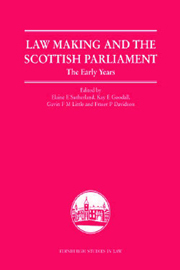Book contents
- Frontmatter
- Contents
- Preface
- List of Contributors
- Table of Cases
- Table of Westminster Statutes
- Table of Scottish Parliament Statutes
- Table of Westminster Statutory Instruments
- Table of Scottish Statutory Instruments
- THE SCOTTISH PARLIAMENT – ITS GENESIS AND OPERATION
- RIGHTS AND SOCIETY
- PUBLIC ADMINISTRATION AND SERVICES
- JUSTICE AND LEGAL SYSTEM
- ECONOMY AND ENVIRONMENT
- 14 Property Law: How the World Changed at Martinmas
- 15 Business
- 16 Environment and Sustainable Development
- 17 Transport
- Index
17 - Transport
from ECONOMY AND ENVIRONMENT
Published online by Cambridge University Press: 05 September 2013
- Frontmatter
- Contents
- Preface
- List of Contributors
- Table of Cases
- Table of Westminster Statutes
- Table of Scottish Parliament Statutes
- Table of Westminster Statutory Instruments
- Table of Scottish Statutory Instruments
- THE SCOTTISH PARLIAMENT – ITS GENESIS AND OPERATION
- RIGHTS AND SOCIETY
- PUBLIC ADMINISTRATION AND SERVICES
- JUSTICE AND LEGAL SYSTEM
- ECONOMY AND ENVIRONMENT
- 14 Property Law: How the World Changed at Martinmas
- 15 Business
- 16 Environment and Sustainable Development
- 17 Transport
- Index
Summary
INTRODUCTION
Transport is an essential part of any society. Transport systems support economic growth and meet expectations for travel and communication in an increasingly mobile society. Despite its importance, investment in transport infrastructure was limited during the twentieth century – a situation aggravated by unprecedented growth in private car use throughout the UK and elsewhere. The last UK Conservative government introduced a range of measures that altered the balance between subsidised public services and market-driven private services. Competition became a key driver in government policy and the deregulation of bus services transformed the lynchpin of the public transport system.
There has also been an increasing awareness of the environmental costs of travel and the need to address environmental impacts of travel and transport systems. The damaging effects of road congestion on economic activity and growth and of vehicle emissions on climate change were being increasingly recognised at the same time as vehicle use became increasingly essential to people's everyday lives.
These were the transport issues and challenges facing the new Scottish Parliament – challenges which had to be addressed in the context of national and local government structures, the legal framework for transport and the environment, and the availability of funding to support investment. In dealing with these challenges, the Scottish Parliament has taken into account the key drivers of infrastructure investment, environmental mitigation and social inclusion.
- Type
- Chapter
- Information
- Law Making and the Scottish ParliamentThe Early Years, pp. 341 - 360Publisher: Edinburgh University PressPrint publication year: 2011



